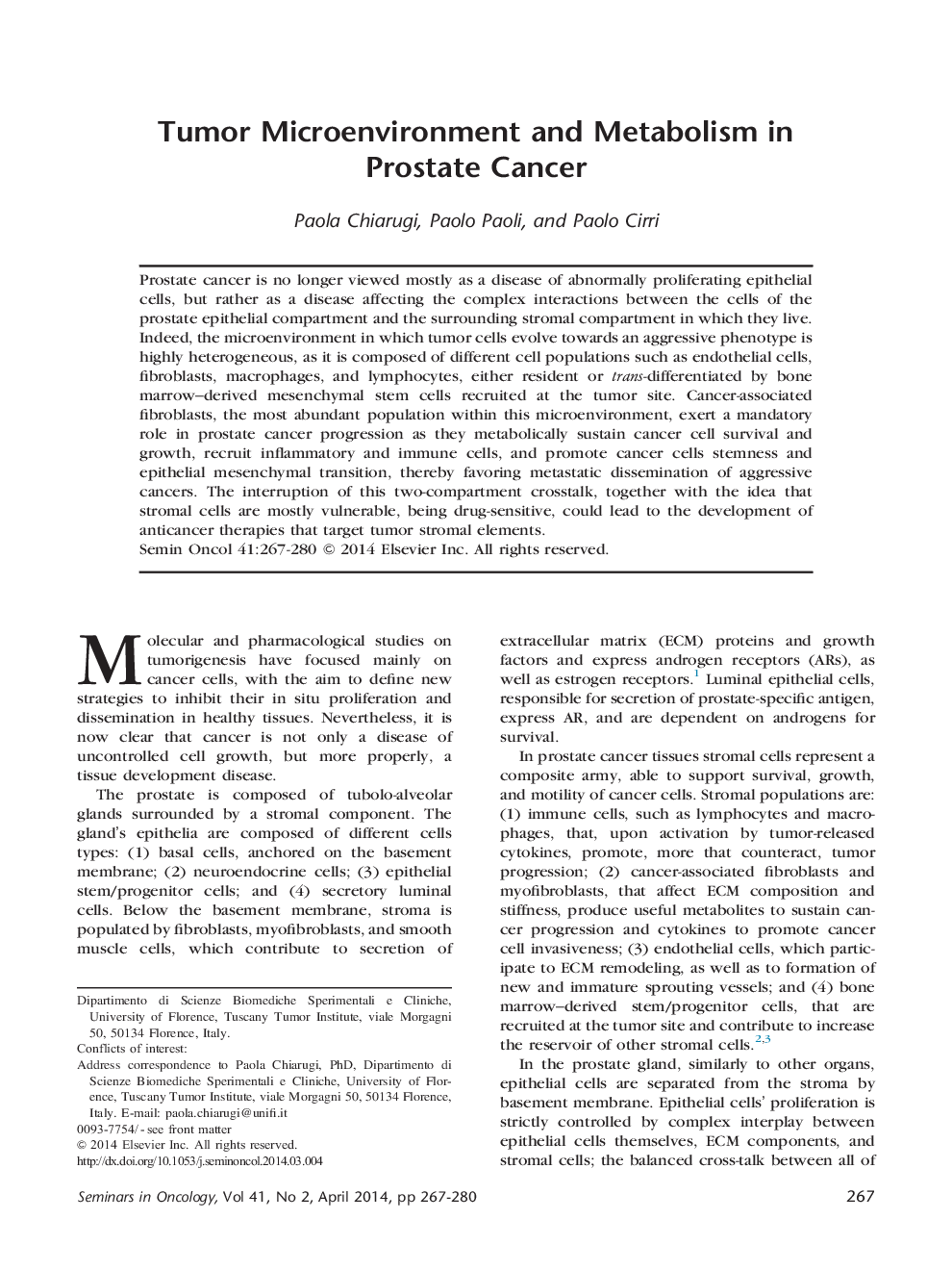| کد مقاله | کد نشریه | سال انتشار | مقاله انگلیسی | نسخه تمام متن |
|---|---|---|---|---|
| 10924344 | 1091212 | 2014 | 14 صفحه PDF | دانلود رایگان |
عنوان انگلیسی مقاله ISI
Tumor Microenvironment and Metabolism in Prostate Cancer
ترجمه فارسی عنوان
تومور میکرو محیط و متابولیسم در سرطان پروستات
دانلود مقاله + سفارش ترجمه
دانلود مقاله ISI انگلیسی
رایگان برای ایرانیان
ترجمه چکیده
سرطان پروستات بیشتر به عنوان یک بیماری سلول های اپیتلیال غیر طبیعی گسترش پیدا نمی کند، بلکه به عنوان یک بیماری مؤثر بر تعاملات پیچیده بین سلول ها از محفظه اپیتلیال پروستات و محفظه استروما اطراف آن است که در آن زندگی می کنند. در حقیقت، محیط میکروتیک که سلول های توموری به سمت فنوتیپ تهاجمی تکامل یافته است، بسیار ناهمگن است، زیرا آن را از جمعیت های مختلف سلولی مانند سلول های اندوتلیال، فیبروبلاست ها، ماکروفاژها و لنفوسیت ها تشکیل می دهد که یا ساکن یا ترشح می شوند توسط ساقه مزانشیمی مشتق شده از مغز استخوان سلول هایی که در محل تومور استخدام می شوند. فیبروبلاست های وابسته به سرطان که بیشترین فراوانی در این محیط می باشند، نقش اجباری در پیشرفت سرطان پروستات را به عهده دارند؛ زیرا آنها متابولیکی سلول های بنیادی و رشد سلول را حفظ می کنند، سلول های التهابی و ایمنی را جذب می کنند، سلول های سرطانی و سلول های مزانشیمی اپیتلیال را تقویت می کنند، انتشار سرطان های تهاجمی. وقفه این تداخل دو قطعه، همراه با این ایده که سلول های استرومائی اغلب آسیب پذیر هستند و حساسیت به مواد مخدر دارند، می تواند منجر به توسعه درمان های ضد سرطان شود که عناصر استرومائی تومور را هدف قرار می دهند.
موضوعات مرتبط
علوم زیستی و بیوفناوری
بیوشیمی، ژنتیک و زیست شناسی مولکولی
تحقیقات سرطان
چکیده انگلیسی
Prostate cancer is no longer viewed mostly as a disease of abnormally proliferating epithelial cells, but rather as a disease affecting the complex interactions between the cells of the prostate epithelial compartment and the surrounding stromal compartment in which they live. Indeed, the microenvironment in which tumor cells evolve towards an aggressive phenotype is highly heterogeneous, as it is composed of different cell populations such as endothelial cells, fibroblasts, macrophages, and lymphocytes, either resident or trans-differentiated by bone marrow-derived mesenchymal stem cells recruited at the tumor site. Cancer-associated fibroblasts, the most abundant population within this microenvironment, exert a mandatory role in prostate cancer progression as they metabolically sustain cancer cell survival and growth, recruit inflammatory and immune cells, and promote cancer cells stemness and epithelial mesenchymal transition, thereby favoring metastatic dissemination of aggressive cancers. The interruption of this two-compartment crosstalk, together with the idea that stromal cells are mostly vulnerable, being drug-sensitive, could lead to the development of anticancer therapies that target tumor stromal elements.
ناشر
Database: Elsevier - ScienceDirect (ساینس دایرکت)
Journal: Seminars in Oncology - Volume 41, Issue 2, April 2014, Pages 267-280
Journal: Seminars in Oncology - Volume 41, Issue 2, April 2014, Pages 267-280
نویسندگان
Paola Chiarugi, Paolo Paoli, Paolo Cirri,
